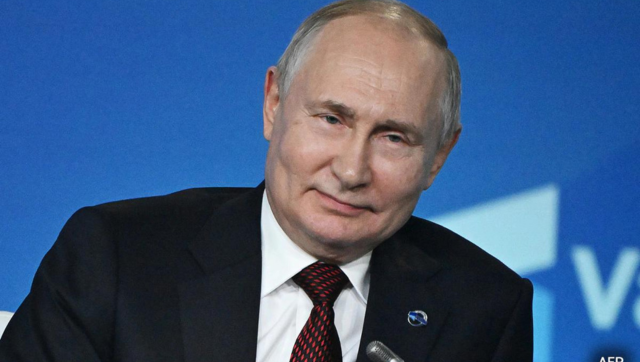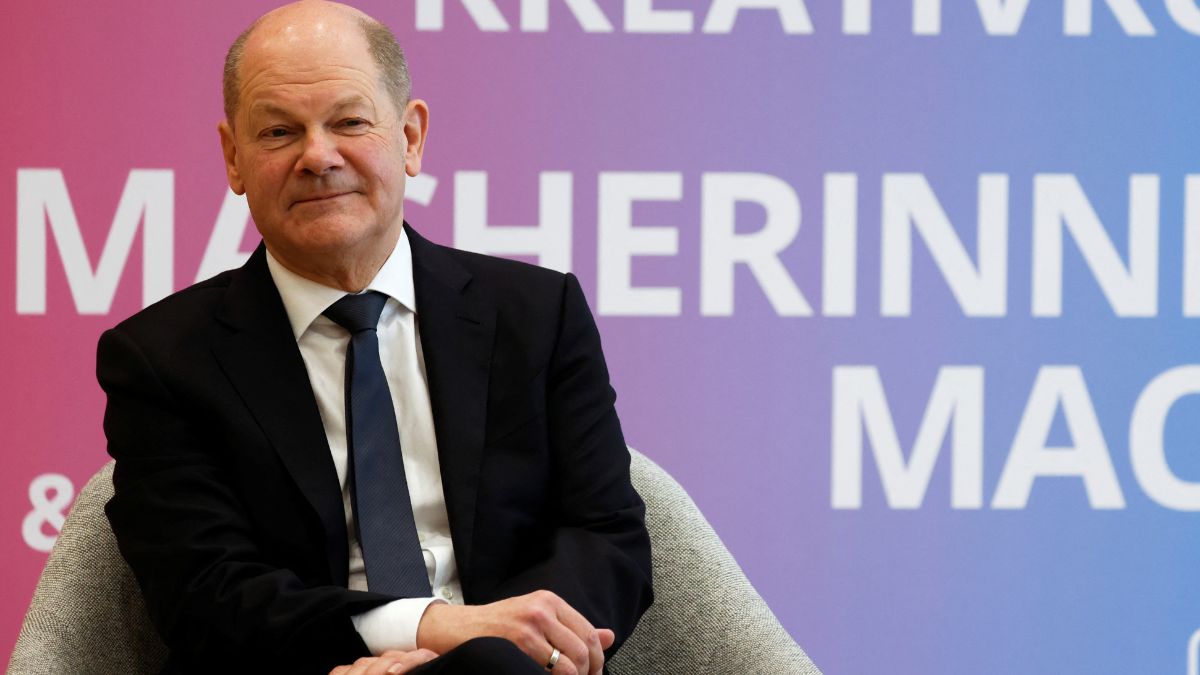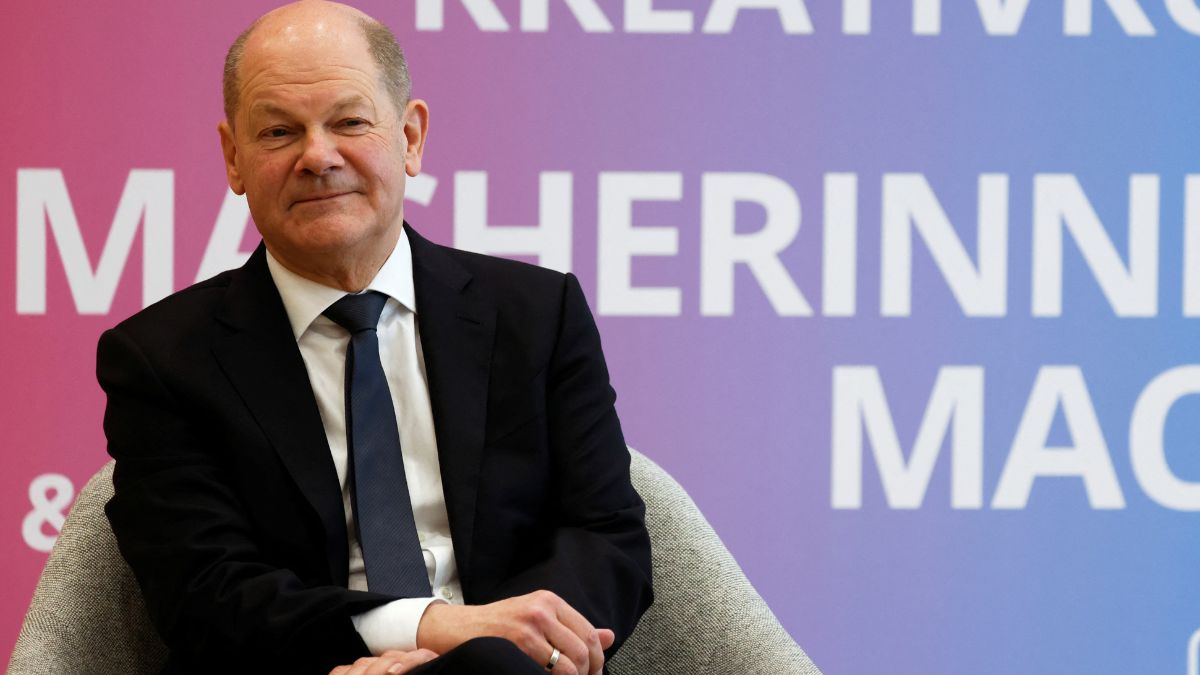In the aftermath of Russia invading Ukraine, the West imposed a series of sanctions to bring Moscow to its knees.
But that hasn’t happened.
Russian president Vladimir Putin in January boasted that Russia is now Europe’s top economy.
He said his nation stands fifth in the world when it comes to purchasing power parity.
“It seems that we are being strangled and pressured from every side, but still, we are the largest economy in Europe,” Putin said at a meeting with entrepreneurs active in Russia’s Far East, according to TASS news agency.
“We left Germany behind and climbed to fifth in the world [in terms of GDP at purchasing power parity. China, the US, India, Japan and Russia. We are number one in Europe,” Putin added.
The Russian president added that the country still “needs to work harder” for the per capita indicator.
“We have left all of Europe behind in terms of purchasing power parity but as for the per capita indicator, we need to work harder. There is still work to be done,” Putin was quoted as saying.
Since the war began, Russia has been unable to access the substantial portion of its foreign exchange reserves held by its central bank which were blocked in the West as a part of the sanctions for its invasion of Ukraine.
But what does the new data show?
Let’s take a closer look:
What does the data show?
Russia’s economy in 2023 performed as well as the UK and France and better than Germany.
As per the IMF, the economy grew an estimated three per cent in 2023.
This, compared to 2.5 per cent for the United States and an anemic .5 per cent for the Eurozone.
Russia’s GDP was expected to grow 2.6 per cent in 2024, 1.5 percentage points more than expected in October.
Growth is expected to ease to 1.1 per cent in 2025.
The IMF noted an “upward revision of 1.5 percentage points over the October 2023 figure for 2024, reflecting carryover from stronger-than-expected growth in 2023 on account of high military spending and private consumption supported by wage growth in a tight labour market.
One caveat remains – the IMF said there could be further revisions since the numbers were preliminary and there were questions about the extent of Russia’s fiscal stimulus..
Russia is also expected to keep spending.
Reuters noted that defence spending will account for almost one third of Moscow’s total budget expenditure in 2024.
Meanwhile, Moscow also plans to ramp up state borrowing to help fund what it calls a “special military operation” in Ukraine in the coming years and is counting on a recovery in oil and gas revenues to pre-invasion levels to do so.
Spending under the “national defence” section of Russia’s budget will total 10.78 trillion roubles ($109 billion) next year, or 29.4 per cent of total planned expenditure of 36.66 trillion roubles, according to the finance ministry’s budget documents that outline the government’s fiscal plans for 2024-2026.
As defence spending in 2024 triples from pre-invasion levels, the share of spending on “national security”, which covers funding for law enforcement agencies, is also rising, set to reach 9.2 per cent in 2024, the documents showed.
Russia’s January budget deficit stood at 0.2 per cent of gross domestic product (GDP), more than five times smaller than the same month of 2023, the finance ministry said on Wednesday, as revenues jumped by 76.6 per cent and spending eased.
Russia has been funnelling ever more resources towards its military and the defence industry since its February 2022 invasion of Ukraine.
Spending on defence and security combined is set to reach around 40 per cent of all budget expenditure this year.
Expenditure in January was 13.2 per cent lower than the same month last year, at 2.7 trillion roubles. In January 2023, Russia had recorded a deficit of 1.65 trillion roubles, or 1 per cent of GDP.
Heavy spending in early 2023 left many analysts predicting a huge budget deficit last year, but high oil prices and Russia’s success in evading Western efforts to significantly curb its energy revenues boosted Moscow’s prospects.
Russia’s main sources of covering its budget deficit are domestic borrowing and the National Wealth Fund (NWF), Moscow’s rainy day stash of accumulated energy revenues.
‘Putin playing long game’
The New York Times noted that consumer spending remains robust in Russia and that an exodus of companies hasn’t materialised.
“Most foreign companies remain in Russia, unwilling to lose the billions they’ve invested there over decades. Other businesses have been sold and now have a through-the-looking-glass feel. Krispy Kreme is now Krunchy Dream. Starbucks has been reborn as Stars Coffee; its mermaid is now a Russian swan princess,” the piece noted.
It added that companies can still pick up raw materials in Russia or even get them from different countries.
“Putin’s economic counterstrikes have helped to fortify support among the elites profiting from the war and to blunt the effects of Western isolation. While Ukraine is preoccupied with short-term imperatives such as shoring up international support, the relative resilience of the Russian economy has enabled Putin to play a long game,” the piece noted.
French-Swiss economist Michel Santi, in a piece for Luxeo.com, said the country has ‘diversified partnerships’ in face of Western sanctions.
“Russian financial transactions on the Chinese CIPS network, a competitor to SWIFT, have doubled in volume in two years, and nearly 20 per cent of its exports are now denominated in Yuan,” Santi wrote.
“Interestingly, some countries like Armenia, Serbia, or Kazakhstan have become massive importers from Europe, reaching their highest historical levels, in a hypocritical scenario where European executives are fully aware that their goods sold to these countries ultimately end up in Russia. In this regard, the Russian state currently has abundant resources as its sovereign wealth fund is rich with approximately $150 billion,” Santi, a financier, writer, advisor to central banks and sovereign funds wrote.
Warning signs?
But there are some warning signs.
Chief Economist, Russia and CIS, at Renaissance Capital Sofya Donets in October said that taking defence and national security spending to almost 40 per cent of all Russia’s expenditure pending may have a strong short-term impact, but will contribute little to growth in the long-term due to their minimal impact on tax revenues.
A Reuters poll in December predicted that Russia’s economic growth would slow in 2024 due to double-digit interest rates throughout the year.
Growth, which has been boosted by soaring government spending, particularly on increased military production, is expected to slow to 1.1 per cent in 2024
High interest rates are seemingly weighing on growth prospects.
The Bank of Russia raised its key interest rate to 16 per cent last week and though it said the rate hiking cycle was near completion, borrowing costs are set to remain elevated for several quarters.
“The rate is now, of course, prohibitive,” said German Gref, CEO of dominant lender Sberbank, opens new tab, planning for rates still above 10 per cent at the end of next year.
“It has sharply reduced not only corporate lending, but even consumer lending.”
The poll showed analysts expect rates at 12 per cent by end-2024.
“We believe the opportunity to lower the key rate will only open up in the middle of next year, when inflation will steadily slow down,” said Mikhail Vasilyev, chief analyst at Sovcombank.
This comes in the backdrop of the Bank of Russia attempting to stymie inflation – which remains stubbornly high.
Inflation, which the central bank targets at four per cent, is seen ending this year 7.6 per cent and slowing to 5.4 per cent by end-2024.
Soaring prices for eggs led President Putin to issue a rare apology last week, as the country’s poorest struggle with painful price increases.
Inflation is one of several economic challenges facing Putin as he seeks re-election in March, although Russia’s success in evading a Western oil price cap is helping ease the burden.
The rouble’s weakness has fuelled inflation in 2023 and analysts give the Russian currency slim hopes of strengthening meaningfully in 2024, expecting the rouble to trade at 100 to the dollar a year from now.
“We believe the rouble will strengthening against major currencies in January due to the seasonal decline in demand for foreign currency at the start of the year,” Vasilyev said, then anticipating steady depreciation.
What do experts say?
That things might be okay for Russian economy – at least in the short term.
Alexandra Prokopenko, a nonresident scholar at the Carnegie Russia Eurasia Center, told Carnegie Endowment if the situation on the ground holds, Putin will manage to see off the rest of 2024 with little trouble.
“The sanctions have isolated the Russian economy from most external shocks,” Prokopenko, an ex- dvisor to Russia’s central bank noted.
But Prokopenko added a caveat.
“However, if there are changes in oil prices, or if the Russian authorities experience some economic success, they might decide to make unexpected expenditures on various projects. This could also bring some distortions to the current design of the budget and the overall performance of the economy,” he said.
They also say predicting the future is a fool’s errand.
“First, there is no planning for three to five years in Russia. Their timeline horizon is quite short, and if someone claims to predict what will happen at the end of 2024, I would say that probably this person is a liar. No one knows. A lot depends on what’s happening at the frontline and how the situation will go there. That also makes all predictions very shaky and weak,” Prokopenko added.
Santi said a labour shortage remains the only threat to the economy.
He wrote, “The gradual shift from a civilian economy to a wartime economy has mobilised more and more workers, both to join the ranks of the armed forces and to retrain in military-related factories. In the end, Russia now enjoys what could be described as full employment, with an average of 2.5 job openings per unemployed person.”
‘Do not scare us’
In a veiled attack on the United States and other Western countries, the Kremlin in October had said that the Russian economy has adapted well to the Western sanctions and Moscow doesn’t fear more such action.
“Russia has been living under a sanctions regime for quite a long time, for decades, and we have sufficiently adapted to it, so such time horizons as five to 10 years do not scare us,” Kremlin spokesperson Dmitry Peskov told reporters, according to Al Jazeera.
Kremlin further said that the sanctions have “boosted” its domestic economy and industrial production.
The Russia-Ukraine war started on 22 February, 2022.
A day after, the European Union introduced wide-ranging sanctions intended to send a clear signal to Moscow that there would be severe consequences for the war.
The bloc has imposed 11 sanctions packages to date and last week said it would work to shut down loopholes in the existing measures.
EU officials have suggested the sanctions could remain in place for years, Al Jazeera reported.
Meanwhile, the Western countries and Kyiv allege that Moscow is engaged in an “unprovoked war of aggression” in Ukraine. On the other hand, Moscow accuses Western powers of using Ukraine to try to weaken and undermine Russia’s own security.
With inputs from agencies


)




)
)
)
)
)
)
)
)